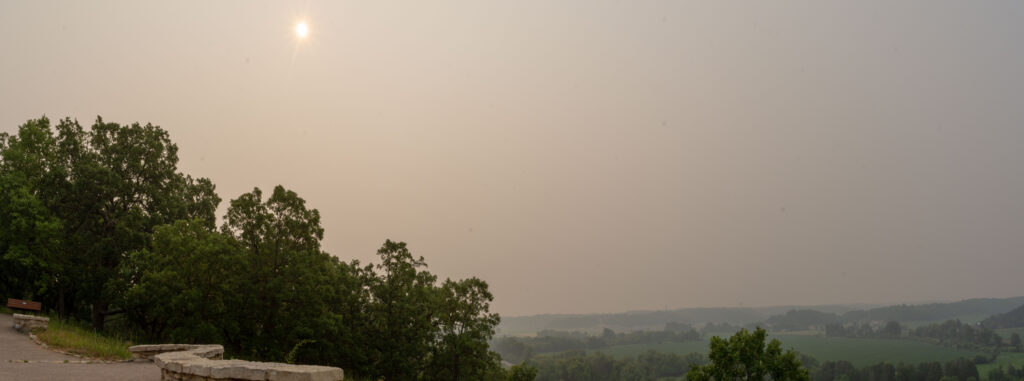Wildfire Smoke Prompts Heath Warnings, Calls for Climate Action
'We cannot accept this as our new normal.'

Haze blankets the sky in the area around Cross Plains in this photo taken at Festge County Park on Tuesday, June 27. (Wisconsin DNR photo)
With haze from Canadian wildfires blanketing much of Wisconsin this week, state health and environmental agencies issued warnings to the public and advocacy organizations called for stronger measures Tuesday.
In a virtual briefing Tuesday, a state health department official said that the general public should stay indoors with windows and doors shut as much as possible during the current period of unhealthy air quality.
Typically air quality recommendations are directed at people in “sensitive groups,” according to Mark Werner, director of the bureau of environmental health in the Wisconsin Department of Health Services (DHS). Those include children, elderly people, people with asthma and other respiratory and heart conditions and pregnant women, as well as people whose work normally requires them to spend a lot of time outdoors.
“This is an unusual air quality event,” Werner said, and DHS is recommending “that everybody take steps to limit their outdoor activities.” People with respiratory or heart conditions are particularly at risk, but the general public should also avoid the outdoors, he said, while keeping windows and doors closed if possible to keep the pollution out.
For people who must spend time outside for their work, for example, an N-95 mask that fits snugly “may be helpful,” Werner said, “but generally we recommend that for the duration of this air quality event, staying indoors is probably the best thing to do.”
Smoke coming from “hundreds of fires” burning in northern regions of the Canadian provinces of Manitoba and Ontario has been drifting down to the U.S. for weeks, exacerbated by weather patterns that keep the polluted air lingering instead of blowing away, according to the DNR.
The DNR issued its latest air quality advisory for fine particle pollution on Monday. The advisory warns of high levels of PM 2.5 — particulate matter 2.5 microns or smaller. A micron is one-millionth of a meter; a human hair is 50 to 70 microns.
The pollution can get embedded in the lungs and sometimes the bloodstream, aggravating asthma and lung and heart disease, according to the Environmental Protection Agency.
The worst smoke conditions this week are in the eastern half of Wisconsin and along the Lake Michigan shoreline. “The majority of the state right now has unhealthy air quality,” Craig Czarnecki, DNR air program public information specialist, said Tuesday.
Air quality monitors are registering “very unhealthy” levels in some parts of the state, including in Waukesha and Milwaukee counties, he said. “In fact, Milwaukee is currently experiencing some of the highest levels of air pollution, not just in the U.S. but across the globe.”
This spring Wisconsin has had its worst string of poor air quality days in more than a decade. Since April, “the DNR has issued nine air quality advisories for PM 2.5 as a direct result of Canadian wildfire smoke,” Czarnecki said. “Before this year, we haven’t had a spring PM 2.5 advisory since 2011.”
In addition, Wisconsin has had 12 ozone advisories this spring, produced by a hot, dry and sunny season, he said.
The air quality alert is to expire at noon Thursday, but until then, the DNR expects the current conditions to linger through Wednesday and possibly into early Thursday before a changing weather system helps drive away some of the wildfire smoke, Czarnecki said.
Once that happens, he said, the DNR’s outlook for the days that follow indicates “good to moderate” conditions for PM 2.5 and ozone levels.
DNR air monitors showed readings ranging from unhealthy for sensitive groups to unhealthy (for all) and very unhealthy across 16 Wisconsin counties Tuesday. Among the worst readings were in Waukesha, Dodge, Milwaukee and Dane counties, where Air Quality Index (AQI) numbers ranged from 189 at one Madison monitor to more than 330 at a Waukesha County monitor.
The current poor air quality warnings prompted Clean Wisconsin to issue a statement Tuesday calling on state officials to address what the organization says is the underlying cause for increased wildfires in Canada and the U.S., climate change.
“We cannot accept this as our new normal in Wisconsin,” said Clean Wisconsin’s energy and air program director, Chelsea Chandler, calling the fires “both products and causes of climate change.”
In response, the organization urged faster action to end the use of coal in power plants and end investment in methane gas plants, oil pipelines and other forms of fossil fuel infrastructure; increase funding for public transit and electric vehicle charging infrastructure; and support policies to encourage more renewable energy development, including large-scale wind and solar development as well as rooftop and community solar power.
In Madison, the activist group Freedom Inc. called on the city and Dane County to issue “an emergency shelter-at-home order anytime the AQI climbs above 151, levels considered ‘unhealthy’ by federal environmental and health agencies.”
The worsened air quality is “a health equity issue that disproportionately affects marginalized communities, including Black people, people of color, refugees, immigrants, and poor people,” Freedom Inc. said in its statement.
The organization called for the Capitol and other government buildings to provide refuge to unhoused people, making indoor public spaces available to members of the public who lack equipment in their homes to reduce air pollution, guaranteeing incomes for low-income people as a public health measure, and ensuring essential workers have personal protective equipment and hazard pay.
Wildfire smoke prompts health warnings, calls for climate action and for public health response was originally published by the Wisconsin Examiner.






















I believe the US has deployed 600 firefighters to Canada. Just 600? The US Army and the other military services have firefighters. What happened to the US Army and military that stepped in and got things done?
It would seem that with a little effort, the US military could deploy forces to help put out the fires in Canada. What happened to a military that found solutions? There is an emergency endangering US citizens and our allies, and nothing?
February 2023, US Army Helicopters were dumping water on a fire on a US military base in Hawaii. US Army Combat Engineers have bulldozers and other equipment to clear fire breaks. Remember when the active US military used to help when there were natural disasters?
Perhaps we should ask Representative Fitzgerald why he voted against an amendment that would have supported active military helping when there is a natural disaster in the United States (unless on the military base). Look at what the 101st Airborne Division did to help after the flooding in Kentucky – nothing. I would think that you would help your neighbors – but when the disaster is in the United States – not much from the active duty force. Outside the United States, the active duty US military helps. US Army was helping in Turkey after the earthquakes.
There are significant problems in the United States. Thousands are dying of drug overdoses, and our billion-dollar national intelligence can’t determine where drugs come from?
Why don’t we demand answers from those we elected – both Republican and Democrat?